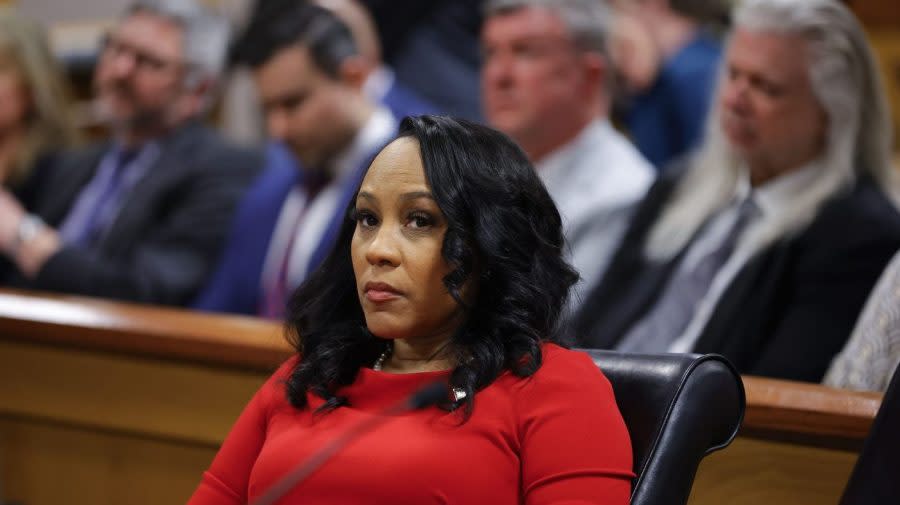Trump, Georgia attorneys clash in final Fani Willis disqualification arguments

Attorneys for former President Trump and his Georgia co-defendants made their final pitch Friday to disqualify Fulton County, Ga., District Attorney Fani Willis (D), attacking her credibility and motives given her romantic relationship with a top prosecutor.
After listening to three hours of legal arguments, Judge Scott McAfee indicated he hoped to issue a ruling in the next two weeks.
“I think it has been very much made clear by the argument made today … that there are several legal issues to sort through, several factual determinations that I have to make,” McAfee said. “And those aren’t ones I can make at this moment. And so, I will be taking the time to make sure that I give this case the full consideration it’s due.”
The judge is now tasked with determining whether Willis and her office should be blocked from continuing to prosecute Trump and his allies, a decision that will dictate the future of the historic election interference case in Georgia. Trump pleaded not guilty to the charges as well as his three other criminal indictments.
Friday’s arguments capped a battle that has now lasted nearly two months over whether Willis’s romance with special prosecutor Nathan Wade amounted to a conflict of interest. Both now acknowledge the relationship but have described the calls to step away as meritless.
“The motion to disqualify should be denied. And Ms. Willis, as the district attorney of Fulton County, and Mr. Wade, as the special prosecutor assigned to this case, should be allowed to remain on this case and continue to prosecute the case,” Adam Abbate, the county’s chief deputy district attorney, said on behalf of the state.
Defense attorneys argued that McAfee only needed to find an appearance of a conflict to disqualify Willis, while the state contended an actual conflict was necessary. The judge previously said he could consider both methods of weighing the evidence and his ruling could hinge on which method he chooses.
“Do you have to find that Wade and Willis lied? No,” Steve Sadow, Trump’s lead attorney in the case, told the judge.
“What you need to be able to find is that there is a concern of a legitimate concern based on the evidence in this case, about their truthfulness,” Sadow continued. “A legitimate concern about the truthfulness, which equates to an appearance of impropriety.”
Fulton County prosecutors countered that the appearance of impropriety is “not the standard” in Georgia.
“The defense has to show an actual conflict, and in this instance, they have to show that the actual conflict would be that Ms. Willis received a financial benefit or gain and…got it based upon the outcome of the case,” Abbate said.
The defense purports that Willis and Wade did not testify truthfully under oath about the timeline of their relationship. While the prosecutors said they began dating in early 2022, defense attorneys contend their relationship started years earlier — before Wade was hired to prosecute Trump.
Testimony from an ex-friend of Willis’, Robin Yeartie, and text messages from Wade’s former law partner, Terrence Bradley, align with defense attorneys’ suggestion the relationship began in 2019, after a judicial conference.
Yeartie said Willis and Wade “no doubt” began dating in 2019, while Bradley — in text messages with defense attorney Ashleigh Merchant, who filed the original motion to disqualify the prosecutors — said their relationship “absolutely” began that year.
However, Bradley described his texts as “speculation” on the witness stand, drawing his credibility into question. Sadow, Trump’s attorney, urged the judge to take Bradley’s private communications, not his testimony, at face value.
“Now, ‘absolutely’ is not a speculative word,” Sadow said. “That’s not speculation; that’s a definitive statement.”
Prosecutors, meanwhile, described Bradley as a “disgruntled, vengeful speculator” and similarly attacked the credibility of the defense’s other witnesses.
John Merchant, an attorney representing Trump co-defendant Michael Roman, told the judge he can “separate the wheat from the chaff when it comes to credibility.”
“If you look at everything put together, judge, they did this, they knew it was wrong, they hid it, and even when they were called out on it, they tried to create an excuse for it by saying it happened after the fact,” Merchant said.
Even if the judge did find that prosecutors lied, it’s still unclear whether he would go as far as to disqualify them.
“Where in the law do we find the remedy to an untruthful statement,” McAfee pressed the defense Friday. “Generally, we send you down the street to the bar.”
For the latest news, weather, sports, and streaming video, head to The Hill.


